
At the end of last year, I wrote about my favorite novels of 2021. That was a popular post, and I love talking about great books, so now it’s a tradition!
Here are some of the novels I enjoyed most in 2022:
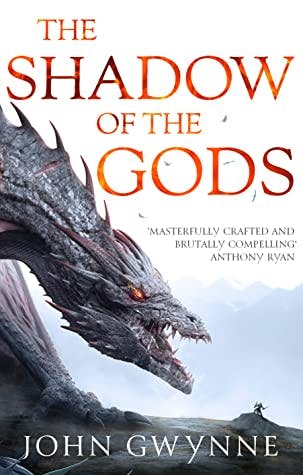
Honorable Mention: The Shadow of the Gods
Sometimes there are no choices. We are swept along in a current not of our own choosing… I will be the current. I will be the course.
Some novels seem like exactly the type you’d love. You’re super excited to read them, but then when you finally do, they’re a slog to get through.
Shadow of the Gods was that for me. I did enjoy it — it’s in this post for a reason. But it might have been much higher on this list had I not started college when I was around 90% done. Shadow sat on my shelf for much of the semester, and I read several other books before returning to finish it.
With that said, this is one of the best-written fantasy novels I’ve read in a while.
Gwynne conjures a Norse-inspired but decidedly unique world in which the “gods” of legend have all died off, and people live in the shadow of their giant remains.
It’s an almost post-Ragnorak tale, and it reads beautifully, with prose almost like poetry at points; the writing is some of the best I’ve seen since “The Name of the Wind”. Unlike Name of the Wind, this book also has a plot.
Shadow of the Gods follows a few Viking-esque characters - a slave trying to honor his sister’s dying wish, a shield-maiden searching for independence and meaning, and a warrior chasing after her kidnapped son - as they deal with the dangers of their perilous, spartan world.
It's an epic tale that mixes together some Beowulf and Tolkien. If you're a fan of historical fantasy or Norse mythology, this should definitely be on your TBR.
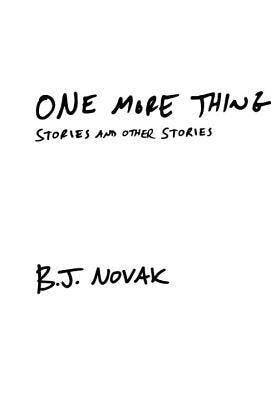
5) One More Thing: Stories and Other Stories
If you love something, let it go. If you don't love something, definitely let it go. Basically, just drop everything, who cares.”
I am generally not a huge fan of short story collections. I enjoy them, but to recommend a book of this format (not titled “The Illustrated Man”), the number of amazing narratives has to heavily outweigh the number of forgettable ones.
That isn’t really the case here - there are even a few I actively disliked. BUT - the ones I did enjoy, I really appreciated.
There’s “The Rematch” between the Tortoise and the Hare, where the Hare actually tries.
There’s “Julie and the Warlord," where a woman goes on a date with an African warlord and debates ethics with him.
And there’s "The Something by John Grisham,” where John Grisham sends his new editor an untitled manuscript that gets published as 'The Something', and next thing he knows it’s #1 on the New York Times Bestseller List.
One More Thing is immensely quotable, with lots of witty humor. Novak also makes several interesting observations; for example:
It is an inside joke of history that all its most exciting adventures inevitably end their careers as homework. Beheadings, rebellions, thousand-year wars, incest on the royal throne, electricity, art, opera, dogs in outer space. B+
And of course:
“Why does carrot cake have the best icing?” MOTHER: “Because it needs the best icing.”
I found some of the short stories thought-provoking, including one about the financial situation of public educators. Others felt half-baked.
Others still were weird and absurdist, such as one where Johnny Depp drives a motorcycle off a mountain. Novak, of course, provides helpful after-story discussion questions:
Do you think Johnny Depp should have driven his motorcycle off the mountain highway to his death? Why or why not?
The stories can be long, or incredibly short. For example, one titled “The Walk to School on the Day After Labor Day” goes something like:
I was sad that summer was over. But I was happy that it was over for my enemies, too.
I think that your enjoyment of this collection will depend heavily on how much you enjoy “The Office”-style humor, and your willingness to sit through some duds to read a few gems. If that’s you, or you’re a fan of short, quick reads, then you’ll get a lot out of One More Thing.
I’ll leave you with Novak’s ultimate discussion question:
Do you think why not is ultimately a better question than why? Why or why not?
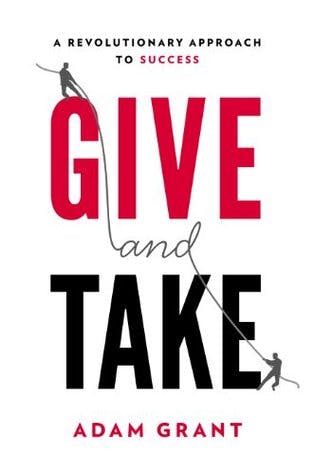
4) Give and Take
The true measure of a man is how he treats someone who can do him absolutely no good.
A lot of “business” or “lifestyle” type books claim to change the way you’ll think about the world. Few do. For me, “Give and Take” has.
Here are some of my key takeways:
- If someone asks you for a favor and it will take less than 5 minutes, you should always do it.
- We have bias for responsibility - we overestimate our own contributions because we can see them, and we underestimate those of others.
- Most people are happy to help you (Pronoia VS Paranoia), especially if you’re asking for advice.
- Consider thoughts in addition to feelings when putting yourself in other people’s shoes.
- Treat everyone as talented when collaborating - it’s a self-fulfilling prophecy.
- Give people agency over whatever it is they're working on.
Above all, I think the most compelling is this:
Success doesn’t measure a human being, effort does.
How we measure success is literally what I wrote my Common App essay on. From past experience, you can put hundreds of hours into a project that intends to do good but doesn’t go anywhere for one reason or another. You can’t control for anything in life other than yourself. If you put forward your best effort, that's enough.
If you found any of those topics interesting, feel free to read the book - but be warned, it is a classic business book in the sense that the first few chapters establish a thesis and then it beats you over the head afterwards with dozens of case studies.
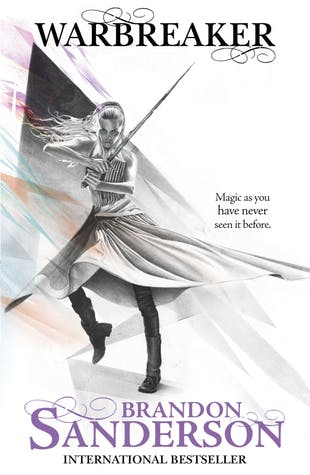
3) Warbreaker
“I swear, my dear. Sometimes our conversations remind me of a broken sword — Sharp as hell," Lightsong said, "but lacking a point.”
Warbreaker is an incredibly colorful book. Literally. Set in a world where people's abilities and life spans are determined by the colors of their souls, the story follows two young women as they navigate a dangerous political landscape and embark on a journey of sacrifice and self-discovery.
Unlike much of Sanderson’s other work - such as the fantastic Mistborn - Warbreaker is a short (for adult fantasy standards), standalone (the horror!) read. Yet that doesn’t detract at all from its stand-out element; the world-building. Nalthis is fully realized and richly detailed, with cults and religions, history, talking swords, and its very-own Greek-esque pantheon of gods.
The main characters, Siri and Vivenna, are both strong and complex, and their contrasting personalities - Siri spirited and impulsive, Vivenna reserved and practical - provide dual perspectives for the novel. Each of them also grow significantly throughout, with Siri’s plot a twisted romance, and Vivenna’s journey heavily inspired by Les Miserables’s Fantine (thankfully, her dream ends slightly more positively).
Lightsong, the third protagonist and one of the afore-mentioned members of the pantheon, is another example of fascinating characterization as a god who doesn’t believe in his own godhood. Through him, Warbreaker explores themes of faith, religion, and redemption.
The pacing of the book is a bit slow at the beginning, but ramps up significantly towards the end for an avalanche of plot twists and payoff. If you’re a fan of fantasy and have been thinking about getting into Sanderson’s work, Warbreaker is a great place to start.
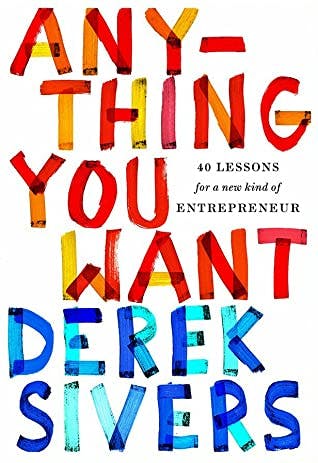
2) Anything You Want
Don't be on your deathbed someday, having squandered your one chance at life, full of regret because you pursued little distractions instead of big dreams.
Earlier in this post I discussed Give and Take, and how unhelpful most books are that try to "educate readers to feel empowered to follow their own dreams.”
Anything You Want is not one of those books. From a page-to-impact perspective, it may be one of the most meaningful books I’ve read since Range. And clocking in around 100 pages, it can be read in less than an hour.
Anything You Want is the story behind starting a small company called “CD Baby” and the lessons that Derek Sivers learned from that experience, distilled into a short read.
He offers a lot of great business advice, but also various meaningful insights on work and life. Here are some of my favorites:
- Starting with no money is an advantage. You don’t need money to start helping people.
- Success comes from persistently improving and inventing, not from persistently promoting what’s not working.
- Your business plan is moot. You don’t know what people really want until you start doing it.
- You can’t please everyone, so proudly exclude people.
- The real point of doing anything is to be happy, so do only what makes you happy.
Anything You Want also contains some spicy takes and opinions Sivers has that may never be relevant to what you’re doing. But he has a clear focus on what’s important:
Never forget why you’re really doing what you’re doing. Are you helping people? Are they happy? Are you happy? Are you profitable? Isn’t that enough?
As Sivers, says - “ultimately, life is about what you want to be, not what you want to have.”
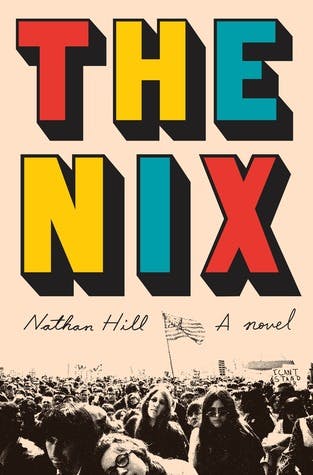
1) The Nix
Seeing ourselves clearly is the project of a lifetime.
The Nix opens with the parable of the blind men and the elephant, in which some blind men touch the leg, snout, or tusk of an elephant and assert that an elephant is therefore sharp, long, or smooth. A king laughs at them for making incorrect observations — but as Nathan Hill points out, the blind men are technically right about the individual parts they experienced; they’re just not able to see the greater whole.
This reminded me of a conversation I had recently where a friend described human perception as three concentric circles — one for the stuff we know, one for the stuff we know we don’t know, and one for the stuff we don’t know we don’t know.
Much of The Nix is about what takes place in that third circle; the things people don’t know about themselves, a person’s struggle to reconcile with their inheritance of generational trauma, the socio-political conflicts that shape our world. It’s a captivating and thought-provoking novel that explores these complexities of familial relationships and identity.
Sometimes we’re so wrapped up in our own story that we don’t see how we’re supporting characters in someone else’s.
The story follows Samuel Andresen-Anderson (not a typo), a failed writer who tries to reconnect with his estranged mother Faye. As he delves deeper into his mother's past, he uncovers pain and shame, the secrets and sorrows that have shaped his own life in ways he hadn’t seen.
Hill has a standout ability to craft dynamic and fully fleshed-out characters. Both Samuel and Faye are flawed, and their relationship is messy and complicated. There are also dozens of additional supporting characters with point-of-view chapters.
The Nix excels at weaving together multiple storylines and time periods to create a rich narrative — telling the tale of dozens of other characters, many of whom have chapters from their perspective, and jumps across decades.
It’s no secret that the great American pastime is no longer baseball. Now it’s sanctimony.
The Nix is also incredibly timely, with many observations on American life, culture, and society. There’s a far-right presidential candidate who makes the most of a scandal (the “Packer Attacker!”), a student who commits every logical fallacy attempting to justify why she plagiarized her essay, commentary on the superficiality of social media, and discussion on the psychology of advertising.
For example, among my favorite quotes in the book (there are too many) describes how extremism can shape narratives within our media:
Imagine a single drop of water: that’s the protest. Now put that drop of water into a bucket: that’s the protest movement. Now drop that bucket into Lake Michigan: that’s Reality. But the danger of television is that people begin seeing the entire world through that single drop of water. How that one drop refracts the light becomes the whole picture.
Hill's prose is sharp and evocative. While there are slow segments — the book takes a complete narrative tangent for an entire part — it is also incredibly creative (with a choose-your-own-adventure subsection), and overall a beautifully written novel that will leave you thinking long after you've finished reading it.
Do you have thoughts on these books? Let me know!
Also, if you're not subscribed to my newsletter yet, what are you waiting for?! The email signup is right below this post.
Until next year... Thanks for reading :)